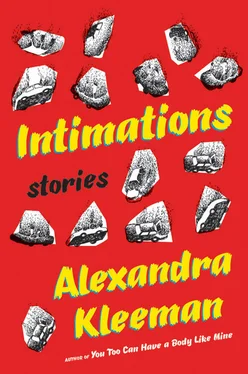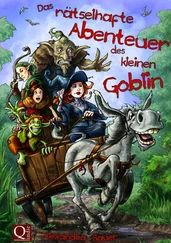Set back within a recess of the coppery wig, two eyes twitch back and forth rapidly, like finches traversing a small cage. They give the appearance of little creatures trying to see past the glorious billows of auburn waves, to see a way out. Below, Victor’s small red mouth pops open and closed, open and closed, a vestige of his former penchant for gnawing at the air. Beyond the red rims, teeth that are blinding white: purer, whiter than any I have seen in the mouths of those raised on more cultivated foods.
I frown to myself. In his treatise on the history of dance, Cahusec writes: “The different affections of the soul are the origin of gestures, and the dance, which is made up of them, is consequently the art of executing them with grace and proportion relative to the affections they express.” Yet I know that this particular gesture originates in young Victor Tallon’s desire to have his chewing-toy returned to him, a base desire reflective of his regression toward savagery. Earlier that day he slyly tried to hand over a piece of chipped wood when I came to recoup it from him before the performance. When I persisted, he made attempts to demonstrate his affection for the toy, miming his pleasure at gnawing upon it, showing that it could be concealed completely within his mouth.
Rooting around among the feverish little points, the wet and roiling tongue, I explained to him that, invisible though it might be, the simple knowledge of its presence would rot the occasion from within, destroying my satisfaction entirely.
4
Young Victor arrived at my door a dwarfish creature, freshly shorn and clothed in a length of linen. He resembled a boy, but only in shape. He lacked a boy’s liveliness and capacity for joy, he would not be enticed by bright scraps of cloth or the antics of dogs at play. To most of the world he was calloused: he did not turn toward the sound of a human voice, nor did he seem to note particularly the difference between a well-enunciated sentence and a hacking cough. He loved to eat and to lie about unbothered and to gnaw upon the objects whose names and functions I attempted over and over to teach him. To all else he was indifferent. I placed his head and hands in the proper position for attending to my instruction, only to look back and find them slumping back into his customary untidy heap. There were times when I watched him rolling around belly-up in the pastures, chewing upon a convenient branch, and despaired that I would ever teach him even the meanest of jigs.
While with most beginning students I would first impart an understanding of the names and qualities of the most common courtly dances, young Victor required a most intricate and time-consuming education. I was faced with the problem of persuading him to pay any notice at all to higher forms of activity, for he was inclined to an eventless life spent supine in various corners of his chamber. Once, I performed an exquisite series of balancés for his benefit, to which he responded by gnawing on my headpiece while I was occupied. In rejoinder, I removed from his daily routine those few things that he favored — food, flowers, and chewable items. I set in their place a system of tutorials directed toward teaching him the most elevated of concepts and behaviors, which I believed he would interest himself in were he not continually able to please himself by putting objects into his mouth. It is in this manner that societies have caused their own advancement: by starving themselves of ready satisfactions, they stir their appetite for finer sustenance.
Unfortunately, my benevolent deprivations created in Victor only the most rudimentary physical effects. With movements and sounds, he complained of his hunger and boredom, of the disuse of his mouth, while I lectured on, discoursing on the subjects of agriculture, ancestry, the difference between present-day architectural ratios and those employed by the ancients. The only tutorial that attracted his attention was my explanation of crying, a sort of footnote to a more extensive lecture on the relationship of emotions to gesture. Victor watched with open mouth as I mimed sadness, even greater sadness, and then indicated with my fingers the streaming of tears down my face. When I made the noise itself, the gutted syllables of a man weeping, he leapt up, clapping with his hands and chuffing madly. As I tried to calm him, he roved about the property uttering sobs and palpating his eyes that they might tear more readily. I pursued his weeping form through the parlor, the library, the pantry, shouting commands at his swift and fleeing back.
When I captured him at last, he wore the expression of an animal smug with unearned fulfillment. His eyes were blister-red, racked with weeping, yet he wept still, wept freely. There was an air of contentment in his weeping that I felt to be incorrect, formally imbalanced, perhaps. Yet when I reached for his throat to amend certain flaws in enunciation, he ceased weeping at once and turned himself away from me. I heard him swallow deeply, as though tucking the remaining sobs into some secret, unseen cavity.
From that moment on, young Victor refused to weep before me, though I often overheard him weeping in private, when lying about in the barn or in some moment of leisure.
5
Victor, I say. Victor, give me your attention. Look at me. I will not ask again.
His great dull head stirs slightly, but remains fixated on a point far to my right. Victor, I say. Victor. Look at me. If you do not look at me, I will have to make use of the rod. I place my hand on the rod for good measure.
He turns his head slowly, achingly toward me. The heavy skull swivels on its stand. It is his chewing-toy that distracts him so, resting naked and exposed upon the side table where I have placed it. He finds it cruel, cruel that he is not permitted to make use of it during this tutorial when I allow it for most of the lectures and dances. I explain again: Victor, we are practicing conversation. We are improving your speech and your pronunciation. You will not improve so long as you insist on keeping that useless bauble in your mouth, where it obscures your breath and proves an obstacle to your tongue, which I remind you has never been as limber as it should.
He seems to have lost interest again. The chewing-toy gleams atop the table, lozenge-shaped and glinting like gold. The rod, I say, remember the rod. With this reminder, he regains a healthy alertness.
Now, Victor, I begin. If another guest should approach you at court and speak to you, uttering the phrase “How do you do?” what should you say?
Victor swivels his tongue around within his mouth, twisting his lips. He has never liked the taste of words, and I sense that he has not developed much of an idea what they are for. He sighs, and his eyes remain upon the toy.
VerywellthankyouandIampleasedtomeetyouhowdoyoudo? he says, all in a rush, his mouth flapping up and down upon the sentence as though it were a piece of meat.
I, myself, am also well, I say. Do you enjoy dancing? I ask.
He stares at me, unsure what to do. I have never given him this prompt before.
Are you enjoying the ball? I ask. This one he has done many times before.
Ohverymuchsowhatareliefitistobeamongpropercompany, he says wearily.
Good, Victor, fairly good, I say. But you would do well to attend to the pauses between your words, for they are as the counts in a measure of music, directing the body toward the greater expression of its own musicality. Measure your breaths, boy, and release them with much care and restraint. Let the words be a dance in themselves, a dance of meaning upon the surface of a tongue.
He stares at me, chewing his finger. He has understood nothing.
6
Swollen-faced Portesquieu leans back in his chair and turns his open maw toward the sky, releasing a moist gibbering of laughter. His mirth strains against the strictures of his clothing, the flesh of his neck bulging sweetly over the stiffened collar. Beads of grease from the lamb leg float upon the dark surface of his ale.
Читать дальше












